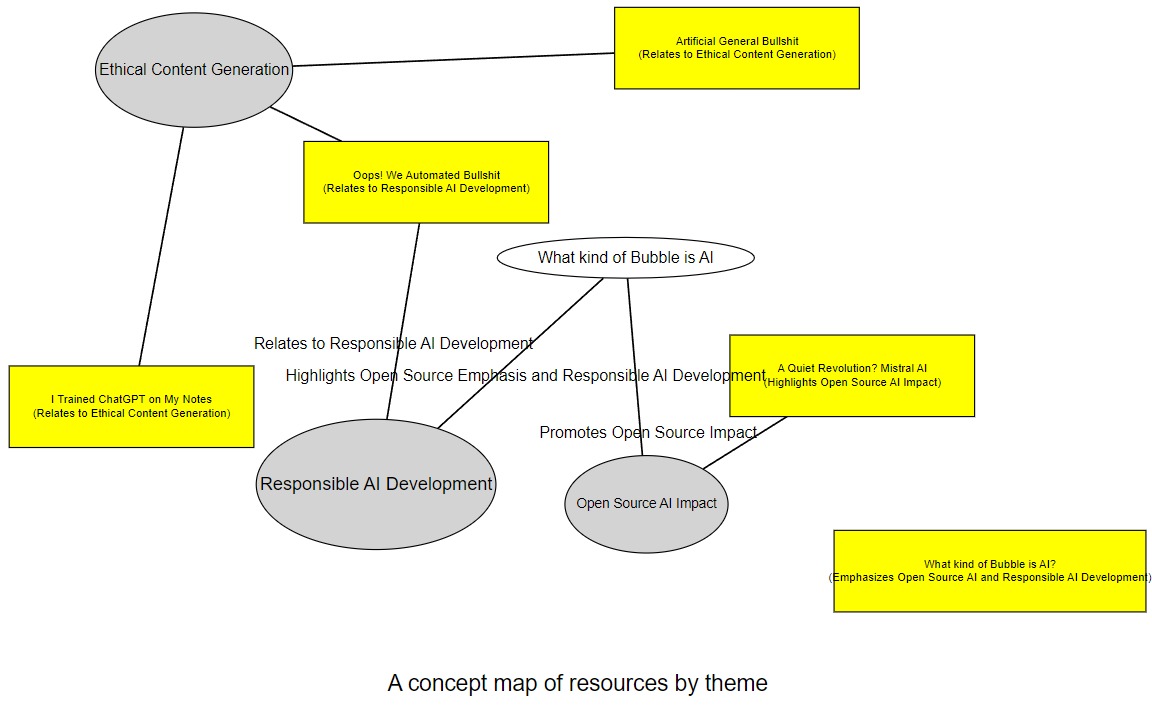This is extracted from C-10-fullnotes-response-gpt35, part of experiment 10.
Title: Navigating the Challenges of Widespread AI Adoption: The Open Source Solution
! Introduction
Introduction
Artificial Intelligence (AI) has undeniably transformed our world, offering exciting possibilities for individuals, companies, and governments. However, this transformative power comes with its share of challenges and risks, especially when AI-generated content can sometimes produce undesirable results. In this blog post, we'll explore the challenges and risks associated with the widespread adoption of AI and investigate how open source AI, exemplified by Mistral AI, could serve as a powerful solution to mitigate these concerns.
The AI Revolution: Blessing or Curse?
The AI revolution has brought forth incredible advancements in natural language processing, image recognition, and data analysis, among other fields. We see AI's impact in everyday life, from chatbots and virtual assistants to recommendation systems and autonomous vehicles. Yet, the rapid growth of AI technologies has raised significant concerns.
Challenges in AI-generated Content
One of the foremost challenges lies in AI-generated content. As seen in the article "Oops! We Automated Bullshit," AI systems like ChatGPT can generate text that may sound persuasive but lacks intelligence or accuracy. These AI systems often rely on predictive text, which can lead to content that may be misleading, biased, or factually incorrect.
Ethical Content Generation
The importance of ethical content generation cannot be overstated. In "Artificial General Bullshit," we are reminded that ethical considerations are paramount when deploying AI. The responsibility falls upon individuals, companies, and governments to ensure that AI-generated content aligns with ethical standards and avoids misinformation.
Responsible AI Development
Furthermore, the development of AI systems must be approached responsibly. "What kind of Bubble is AI?" emphasizes the need for responsible AI development and the potential consequences of an AI bubble. It highlights the risks associated with dependency on tech giants and the importance of fostering innovation through open source initiatives.
Enter Open Source AI: Mistral AI
In the midst of these challenges and risks, open source AI models offer a ray of hope. Mistral AI, as featured in "A Quiet Revolution? Mistral AI," represents a significant milestone in open source AI development. Mistral AI is akin to GPT-4, boasting a context size of 32k tokens and utilizing a "Mixture Of Experts" model, which combines several highly specialized language models. What makes Mistral AI particularly noteworthy is its open source nature.
Transparency and Accountability
Open source AI models like Mistral AI provide transparency into their algorithms and architectures. This transparency allows developers and users to understand how content is generated, thereby identifying potential biases or inaccuracies. Users can have greater confidence in the generated content when they can inspect and scrutinize the model's inner workings.
Customization and Control
One of the essential advantages of open source AI models is their customizability. Users can fine-tune these models to suit specific use cases and domains. This level of control empowers users to shape AI's behavior, reducing the risk of generating misleading or inappropriate content.
Community Oversight and Ethical Guidelines
Open source AI projects often have active communities that collaborate to maintain and improve the models. These communities can provide oversight and review of AI-generated content, helping identify and address issues related to misinformation or biased content. Ethical guidelines can also be established within these communities, ensuring that the generated content aligns with ethical standards.
Diverse Data Sources
To mitigate biases, open source AI models can be trained on diverse and representative datasets. By exposing the model to a wide range of perspectives and information sources, these models are less likely to produce biased content.
Community Feedback and Iteration
Open source AI models can incorporate feedback from the user community. Users can report issues, errors, or instances of problematic content, prompting developers to make improvements and refine the model's behavior over time.
Reduced Dependency on Tech Giants
One of the critical advantages of open source AI, highlighted in "What kind of Bubble is AI?," is the reduced dependency on tech giants. By offering alternative solutions to proprietary AI systems, open source AI models make AI development and content generation more diverse and resilient to changes in corporate environments.
Conclusion
The challenges and risks associated with widespread AI adoption are real and should not be underestimated. However, open source AI models like Mistral AI offer a promising solution to mitigate these concerns. Through transparency, customization, community oversight, and adherence to ethical guidelines, open source AI fosters responsible AI development and content generation.
As we continue to embrace the benefits of AI, let us not forget our responsibility to ensure that AI-generated content adheres to ethical standards and serves the greater good. With open source AI at the forefront, we can navigate the AI revolution more confidently, harnessing its power while minimizing the associated risks. Open source AI is not just a technological advancement; it's a path to a more responsible and ethical AI future.